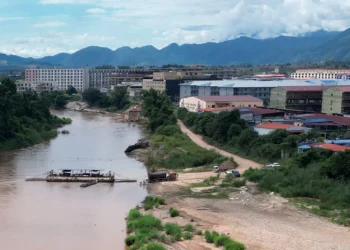Myanmar’s successive military regimes have never been known for the sophistication of their efforts to win over international observers, but that hasn’t kept them from trying.
Last week, the current junta made its latest attempt to control the narrative by allowing Don Pramudwinai, Thailand’s outgoing foreign minister, to meet with Aung San Suu Kyi, leader of Myanmar’s ousted ruling party. That move, reminiscent of how Suu Kyi was used by previous regimes to deflect criticism, was revealed by Don himself at a meeting of his counterparts from the Association of Southeast Asian Nations in Jakarta.
But at least one news outlet seems to have had a heads-up on this unexpected development. PanOrient News, based in Japan, broke the news last Tuesday, a day before anybody else knew about it. Kyodo, a much larger Japanese news agency, also picked it up early, but did not provide a full report until the next day.
PanOrient News is a little-known outfit established in 2006 by Khaldon Azhari, a Syrian journalist based in Tokyo. Despite the obscurity of his organisation, Azhari was, for several years, president of the Foreign Correspondents’ Club of Japan (FCCJ).
What is remarkable about Azhari’s scoop, apart from the fact that it is not related to either Japan or the Middle East, unlike most of the other stories on the PanOrient website, is that it included details that were not reported elsewhere, even after Don confirmed that a meeting with Suu Kyi had taken place.
Specifically, he includes this claim: “Aung San Suu Kyi confirmed in the meeting that she neither recognises nor supports the People’s Defence Forces or the National Unity Government accused by the government of Myanmar of ‘terrorism and the killing of innocent people,’ and of being ‘supported by Western countries.’”
This message, if true, would be music to the ears of none other than Min Aung Hlaing, the leader of the coup regime that seized power two and a half years ago. But how could PanOrient be party to this information if, as the junta’s spokesperson Zaw Min Tun has claimed (somewhat implausibly), even the regime itself does not know what was discussed at the meeting?
‘A disgrace to his profession’
At this point, it should be clear that Khaldon Azhari is not just a reporter who got a lucky break on a story that attracted a fair amount of attention last week. It is much more likely that he is the latest in a long line of journalists recruited by Myanmar’s military to propagate its version of events in the country.
This has been in evidence at least since May, when he made a visit to Myanmar that included an “exchange of views” with junta-appointed foreign minister Than Swe. While his one-man press junket yielded just one story on the PanOrient website—“Myanmar seeks to boost economic, investment ties with Arab countries,” based on an interview with the regime’s commerce minister, Aung Naing Oo—it presumably paid off in other ways.
For its part, the junta made much of his visit. On June 6, the Global New Light of Myanmar, a regime mouthpiece, published a long interview with the “veteran correspondent” and former FCCJ president in which he summarily dismisses much of what has appeared in mainstream media reporting on the country as “hype, propaganda or fake news.” He even suggests that “videos of any attack can be created in any studio across the world. I can be in a studio in New York and present as if I am in Myanmar.”
He also adopts the language of his hosts to describe the country’s most persecuted minority, the Rohingya, as “illegal Bangladeshi immigrants.” In response, Nay San Lwin, a co-founder of the Free Rohingya Coalition, described Azhari as “a disgrace to his profession [who] is now regurgitating the junta’s propaganda.”
Interestingly, the same interview appeared again later in the month on Myanmar Insider, a publication owned by Aye Chan, the son of retired admiral and junta hardliner Soe Thein. In August of last year, Aye Chan created a stir at a regional media conference held in Dili, the capital of Timor-Leste, by delivering a presentation that was a full-frontal assault on other Myanmar media outlets that challenged the junta’s monopoly on truth, describing them as “a tool for terrorists.”
On the attack
That incident perhaps signalled the regime’s intention to take a more aggressive stance on countering coverage of the daily onslaught of violence that it has inflicted on Myanmar’s people since the February 2021 coup. But it was not the first time it had tried to create an alternative reality in a bid to discredit its opponents.
Soon after seizing power, the junta hired Ari Ben-Menashe, an Israeli-Canadian lobbyist, to help it improve its international image. Among his ideas for selling the coup was to suggest that the generals felt it was necessary to prevent Suu Kyi from forming an alliance with China.
When that argument failed to convince anyone, he arranged for CNN reporter Clarissa Ward to travel to Myanmar to see for herself that the situation there was not as dire as the country’s dissidents had professed. Instead, she reported on widespread defiance.
“Fearless local journalists and activists have risked everything to show the world what is happening, while outside access to the country has been blocked and cuts to wireless internet networks and broadband stifles communication from within,” she wrote a few months before Ben-Menashe’s US$2-million contract was “paused” over payment issues.
Since then, the junta has had to rely on its own, even cruder attempts to use foreign journalists to spread its message. Last month, it found a willing pawn in S Venkat Narayan, president of the Foreign Correspondents’ Club of South Asia. Invited by the Global New Light of Myanmar to offer his “professional inputs” to the newspaper (which he claimed not to know was run by the military), he received the same treatment as Azhari, complete with meetings with senior junta officials.
But as a sitting FCC president, he also had to deal with a backlash from members. In a letter signed by 10 foreign journalists who resigned from the club in protest at his actions, Narayan was castigated for his decision to cooperate with a regime that “has jailed 70 journalists and is ranked 173 out of 180 countries in the latest press-freedom index compiled by Reporters Without Borders.”
But perhaps because he is no longer accountable to any organisation but his own, Azhari has gone all-in with the regime. “We should act proactively instead of just reacting to negatives from others,” he says in his interview, apparently taking on the role of a cut-rate version of Ben-Menashe.
“In Myanmar’s case, the best way for the attack is to attack. You need to attack the case, you need to go forward very aggressively,” he says, offering the kind of advice that will make perfect sense to generals who really know of no other way to handle a crisis of their own creation.
Source – Myanmar Now






